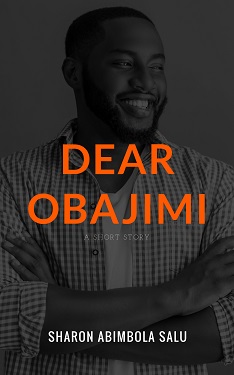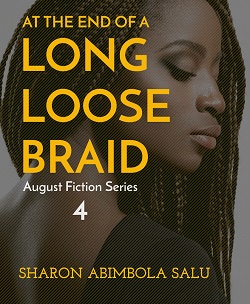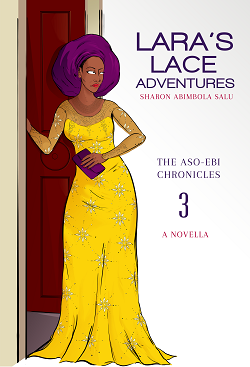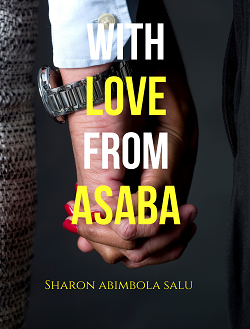Happy February! Can you believe it’s the 2nd month already? Na wa! In today’s episode of Falling in Love With My Best Friend, our ongoing Nigerian Romance series, we see how Asake Ladoja, Enitan’s mother, handles the news she received in the last episode. And on her birthday, Enitan gets a special birthday gift.
To everyone reading this series, thank you for being so patient with me. 🙂
Have an awesome week. And month. 😉
Episode 12: Her Birthday, His Special Gift
From the sound of my mother’s voice, she had certainly been waiting for me. And by waiting, I mean, she had been patiently letting my sins pile up, waiting expectantly for the day of judgement.
She, of course, was both Judge and Jury, and with my father absent from the house, she was free to lash out at me any way she liked.
So, I obeyed. I went to the parlor, trembling with fear, and knelt down, waiting for the storm of my mother’s anger to strike.
But, she didn’t come immediately. She was making ikokore for my father, which was certainly not his favorite meal, but as long as there was enough meat, shrimp and smoked fish, specifically, eja yiyan, he was less likely to complain.
So, I had to wait another twenty minutes on my knees, while she got the food ready.
I was surprised that she did not ask me to help her. No, she singlehandedly tackled the cooking, while I stewed in my own guilty thoughts.
What will she do to me? Oh-oh, let her just do it already! What is taking her so long?
I didn’t realize it, but slowly and surely, as I knelt down there, I began to pray for punishment. I prayed that it would be swift and relatively painless, not long drawn out and torturous. But, like I’ve already mentioned, that was totally up to Asake Ladoja.
I had no idea what she was planning. As I knelt there, fending off thoughts of grievous bodily harm, I could hear her hustling and bustling in the kitchen.
I heard the grating of water yam on the metal grate, the chop-chop sound of a knife landing on the wooden chopping board as it reduced meat, shrimp and other ingredients into even smaller pieces.
Every now and then, I also heard the energetic hum of the blender turning fingers of dry pepper and possibly crayfish, into powder, which would be sprinkled and eventually merge into the flavorful soupy base. Once that base was thick enough, the grated yam would go and join the party in the pot.
All of these sounds I heard, as my eyes roved from the white ceiling to the ceiling fan rotating at a medium pace right above my head, to the family portraits hanging on the wall, to the soft brown rug where I rested my knees, and then back to the ceiling.
But I was sweating in spite of the fact that the fan provided steady cooling, mostly because above the noise of kitchen implements clashing and complimenting each other to churn out our dinner, I could hear the sweet melody of my mother’s voice singing a few of Ebenezer Obey’s “pre-conversion” songs.
Never did my mother’s voice ring so loud and clear, never did her voice sound as sweet as it did in those moments.
Knowing what I knew, I was terrified. I wanted to just rush into the kitchen, and hand her a belt, or cane, and yell:
“Just do it!”
But since my full name was not Enitan “You-Dey-Find-Trouble” Ladoja, I decided not to add to my list of trespasses by further disrespecting and enraging my mother.
So, I waited.
Once, I suppose, all the ingredients were nicely tossed into the pot, and the heat had been reduced to let the pot simmer, I heard the slap-slap of my mother’s rubber slippers coming from the direction of the kitchen.
From where I knelt, I heard her feet enter the dining room and then they travelled into a certain corner of the dining room. Instinctively, and because I was familiar with every nook and cranny of the house, including the treasures they held, I knew what was going on, even though an entire wall, blocked that corner from my view.
In a corner of the dining room, my mother kept a stack of canes. They varied in terms of length and thickness. The thickest one was as wide as two fingers rolled into one, and the thinnest one, was wiry, more flexible and bendable, and made an awful whipping sound when it was used to beat the air.
From my experience, the thinner canes were the worst, and once they hit your skin, it felt like a thousand soldier ants had decided to turn your body to their battle ground.
It peppered like crazy!
Without seeing my mother, I could only judge from the sounds I heard, what her choice was. Another song, this time around by King Sunny Ade, played on her lips, just before I heard the dreaded whipping sound of a thin wooden stick zipping through the air.
She had chosen the thin one, the cane she knew I hated the most.
I was definitely in soup.
Then, I heard her feet march towards the sitting room, and after pausing briefly to leave her slippers at the edge where the rug started, I turned around to see her feet land heavily on the carpeted floor of the parlor.
Although she was still humming, her eyes were blazing. Then, she took a seat directly opposite me with a louvered window behind her, net curtains blowing in the wind.
She leaned back with a sigh, while her hand dangled the cane aimlessly.
For a moment, I thought I was safe. I was still out of her reach, as I had picked the very center of the room to kneel down.
Then, suddenly, as if she had just remembered her mission, she sat up, and perched at the edge of her seat.
“Iwo, sun mo bi,” she said, in a low, clear voice, motioning with her cane for me to move closer to her.
“Ma? Me?” I asked, pointing to myself, while my eyes searched the room to see if perhaps, I had a sister I had never met before, who had decided to make an appearance at that very moment, just to chop cane in my place.
No such luck.
It was just me and my mother.
All of a sudden, she looked up and shouted:
“Yemi! Yemi! I know you’re standing there. If you don’t vamoose and go to your room right now, wa j’egba!”
How my mother knew or had heard Yemi creep to the entrance of the dining room to listen to her confront me, I don’t know. I certainly hadn’t heard him come, but once she threatened to flog him too, I heard the scampering of bare feet on the terrazzo floor, following by panting and thumping as Yemi ran upstairs.
Satisfied that we were now truly alone, my mother repeated her command, this time in English.
“Are you deaf, Enitan?”
I shook my head.
“Thank God I didn’t give birth to deaf children,” she said, momentarily raising her hands to the heavens in thanksgiving. I wondered if heaven would save me from her wrath.
Only time would tell.
“I said move closer!” she shouted.
I dragged my knees, just an inch closer to her. Clearly, I was testing her patience.
“Closer!” she yelled furiously. And then, she slammed the cane on a spot on the ground, which was perpendicular to her nose.
I came as close to that spot as I could, but certainly not close enough to feel her hot breath on my skin. Then, I heard her say these words:
“What were you doing with a boy?”
“Ma?”
“Were you not with a boy this afternoon?”
“Y-e-e-s-s, ma. But we’re just friends, Mummy. Nothing ha–”
“Did I ask you?” my mother bellowed. Looking confused, I wondered if perhaps I had misunderstood my mother’s question. Not to worry. She fired another round of questions at me.
Keeping my eyes on the cane, which she held firmly in her right hand, my mother said:
“What have I told you about boys?”
“That I shouldn’t get pregnant?”
“Oh! So, you even know about pregnancy?! And yet you were climbing on top of a boy’s back, ehn?” my mother roared jumping to her feet.
I also jumped to my own feet, unwilling to get beaten on the floor.
“Kneel down there!” my mother yelled.
“Please Mummy,” I said, rubbing my palms together in my plea for mercy.
“I said kneel down! Don’t mummy me!” she shouted.
I obeyed.
“Were you or were you not letting a boy fondle you? In public? Laarin titi? Ehn? Open your mouth and talk.”
“Yes … No … Yes … Mummy, please I can explain.”
“Explain what? That my daughter wants to disgrace me and spoil my name in this community? Haven’t we raised you well? What were you looking for with a boy? What were you doing on his back? You people have been doing love ehn? Love in Tokyo?! Answer me!” she yelled, slamming the cane on the ground again.
“No, Mummy. Remember my leg? Remember on … on Monday, I injured it and yes … Mummy, remember you and Daddy gave me plaster and iodine?”
“Ehen?” said my mother, arms akimbo, still holding that cane, but looking less furious. “I’m listening.”
“Yes, ma. So, when we … When I got to that junction–” I continued, pointing wildly towards the ceiling fan, as if the junction was right above our heads, “–there was plenty water.”
“Ehen? And so?” my mother said, glaring at me, and stamping her foot impatiently.
“So, because of my wound I didn’t want to put my leg inside the water.”
“Who asked you to put your leg anywhere?”
“Nobody, Mummy. It’s just that it was a short cut and the other road is too long and–”
“And? Go on.”
“So, my friend … he offered to … to carry me over the water …. on … on his back, so–”
“So-o-o, so-o-o, you as a big mumu, you now agreed. No be so?” said my mother in a mocking tone. “If your friend tells you to put your hand inside fire, you’ll kuku throw your whole body inside abi?”
“But mummy, it was just because of the water. It’s not like that every day,” I protested.
“Ehn? Ki lo wi? Every day ke? E gba mi! So, you’ve been going home with this boy every day? You didn’t think your parents should know, ehn? And you were living in this house? Under this roof?” my mother asked incredulously.
“He lives around here, ma. We go to the same lesson, so from there, we take bus and come home together. That’s all.”
From the expression of horror on my mother’s face, I might as well have confessed to joining a gang of armed robbers who only robbed people of portable musical instruments.
Goje, Cello, Oboe, Saxophone, Flute, Recorder …
“Eh! And you’re stupid enough to say, that’s all. You used your own mouth to confirm that I have warned you about boys and pregnancy. Yet, you carried your two legs, jumped on a boy’s back, shinning your teeth like an idiot, and let him carry you nita gbangba. In public. You, my own daughter! Wait, let me even ask you: did you leave your commonsense at home? Is it under your bed? Is that why you’re busy exposing us to ridicule like this?”
“No, ma.”
“So, why did you–” she began, and then, sniffing the air, she realized that the food was almost burning.
“Yemi! Yemi! Come and put off the fire under the food I’m cooking!”
She could just as easily have walked over to the kitchen to turn it off herself, but she refused to abandon this interrogation, choosing instead, to risk burning my father’s dinner.
Yemi promptly came bounding down the stairs, turned off the heat, and at her further command, yelled all the way from the parlor to the kitchen, he moved the pot to a cold burner. Then, he returned to exile in his room.
We heard the thump of his feet on the staircase as he ran to his room. After she heard him shut the door of his room, my mother continued from where she left off.
“Now, this boy you were displaying this mumu behavior with, who is he? What’s his name?”
“You know him, ma,” I replied, reluctantly. I knew my mother’s reservations about Tokunbo and his family. She wouldn’t be pleased to learn that Tokunbo was the giver of piggy back rides.
“Oh, is there more than one? Ehn? Are there so many boys that you can’t even remember their names?” my mother demanded angrily.
“No, ma,” I replied, angry that I was being accused of promiscuity. No, that was Tina’s forte, not mine.
In that moment, in fact, I wondered:
What Would Tina Do?
I couldn’t picture Tina divulging sensitive information like the names and addresses of her male friends, even under pressure, to her mother, so I did the unthinkable.
I lied.
“His name is Ola, ma.”
Technically, it wasn’t a lie. That’s what I told myself.
Tokunbo’s full name was Olatokunbo, so I just provided my mother with the lesser known, and ultimately, lesser used part of his name.
My mother clapped her hands together in amusement.
“Eh-hen, Enitan, I didn’t know that you’ve now joined the league of liars too. Ola? Hehe! You must think I was born yesterday,” she scoffed.
How did she know?
“What’s his real name?” she demanded.
I kept my mouth shut as my brain worked overtime, trying hard to figure out what to do next. However, before my brain could present a plausible and realistic answer, my mother had decided her own next course of action.
“Oya, since it’s taking you too long to remember his name, let me help you. In fact, why should I bother? It is you who will help yourself,” she chuckled.
“Ma?”
“Now, slap yourself!” she commanded.
I blinked in confusion at her command. It wasn’t that I didn’t know how to slap myself or that the command was unfamiliar to me.
No.
I just couldn’t understand why she chose the “slap yourself” route. Would she ever use that cane?
Let me explain.
You see, with “slap yourelf,” there was multiple humiliation and pain served up at one blow. If I didn’t slap my own self to her satisfaction, she would threaten to do it for me. In an effort to avoid her taking over, I would keep increasing the force and intensity with which my own hands struck my face, tortured by the fact that I was both punisher and victim.
And, my mother even after repeatedly slapping myself, would still slap and beat me.
Double whammy!
So, in an effort to end this extensive punishment and just go straight for the kill, I rebelled.
“No, I won’t. I can’t,” I mumbled, shaking my head and looking away.
My mother did a double take. She looked like I had just spat in her face.
“Come again?” she asked, eyebrows raised.
Deciding to temper rebellion with a bit of sense and respect, I said:
“Please ma, don’t make me do it. I didn’t do anything wrong. But if I did, I’m sorry.”
“So you’re calling me a liar, ehn?” she asked. I could almost see smoke streaming from her nostrils.
That did it.
My mother descended on me with the fury of a wounded lioness, and I felt both the cane and her hands, land on several parts of my body in no particular order. Notably, my arms, legs, back and buttocks were not spared. But even in her rage, she was careful not to touch my face.
With each smack and lash, she shouted almost breathlessly in interspaced batches:
“In-your-life-never-ever-ever-talk-back-to-your-mother-Leave-boys-alone-Face-your-books.”
She would have continued till she was satisfied that I got the message and that the urge to rebel had been thoroughly expelled from my body, but by the special mercies of God, a minute and a half into her flogging session, I heard the horn of my father’s car, followed quite surprisingly by his voice:
“Mama Tayo! E duro o! Leave that girl alone!”
Could my father hear my screams of terror and cries for mercy all the way from the gate? Did the whole neighborhood know that I was getting disciplined by my mother? Did Tokunbo know, since he lived right next door?
My mother relented and told me to go and open the gate for my father. Through tear-stained eyes, and with snort pouring out of my nose, not to mention the pain that radiated through my body, I hobbled out of the house, grateful to feel the sun on my face, even though the sun had already begun its slow descent.
I went to open the gate and saw my father standing outside his car. For a moment, I thought I was dreaming or that maybe my mother’s beating had brought on a temporary set of hallucinations. Standing beside my father, still dressed in school uniform, was Tokunbo. His eyes widened in disbelief and his mouth hung open when he saw my sorry state.
“Oh, I’m so sorry, Enitan. Sorry,” he said, his voice conveying the guilt I had read in his eyes. And then, as if he just realized that we were not alone, he added:
“I just told your father everything. He understands what happened. Sorry.”
I nodded, unable to speak. My father pulled me close to his side, rubbing my arm affectionately, and I began to sob again.
“It’s okay. Wipe your eyes. Clean your face and go to your room. I’ll talk to your mother.”
I obeyed, but not before I saw my father turn to Tokunbo and say, “I’ll handle it from here.”
I left Tokunbo standing there, while my father drove his car into the compound. I heard the clang of metal and iron as he locked the gate after himself.
I slunk to my room, where I cried even harder. My father’s planned rescue had come too late. Yes, Tokunbo had reported the entire incident to my father who seemed to be more understanding than my mother, but there was no escaping that punishment.
What was done was done.
Even as I lay on my bed, drenching my pillow with tears, I plotted in my heart to take my mother’s advice and stay away from boys. Except that in my case, there was just that one boy: Tokunbo.
As my mind weighed this option, I felt a sharp pain in my chest. With each resolve to put Tokunbo behind me, the pain only grew worse, and I didn’t understand it.
Weren’t we just friends? Why was it so difficult to let go?
I didn’t have a name for this feeling, and in fact, I didn’t even realize it was a “thing” until later.
However, before I made a final decision on whether or not to continue this friendship with Tokunbo, I overheard a loud argument between my parents on the issue of disciplining me.
From the moment my father stepped into the house, I heard him and my mother arguing. Their voices almost shook the house, with my father’s voice ringing louder and clearer than my mother’s. And because from the words that filtered through the walls to my bedroom I could tell that this discussion concerned me, I did what I usually did: I went to eavesdrop.
But this time, there was no apoti under any window. Rather, I crept to the top of the stairs and listened.
My parents were in the sitting room, and I could hear my father accusing my mother of flouting his instructions.
“I am the head of this family. You do what I say!” he yelled.
“Only if you say it on time, Baba Tayo!” my mother shouted back. “I might be your wife, but I don’t read minds. After I’ve finished beating her, you tell me not to touch her? Too bad!”
“Asake, why are you like this? Isn’t Enitan also my daughter?”
“I’m beginning to wonder too, because I don’t know why you, as her father, should object to me disciplining our daughter. Did she tell you what she did?”
“She didn’t need to. He did,” said my father.
“Who? Tani?” asked my mother.
“Tokunbo, of course,” my father replied.
I heard a loud cackle from my mother.
“Why am I not surprised?” she said finally. “Kokoro to n j’efo inu efo l’owa.* This is a prime example.”
“Mama Tayo, there’s no kokoro anywhere. You’re over-reacting as usual. Must you always flog these children, ehn? Didn’t we agree that once they became teenagers, we wouldn’t beat them again?”
“I don’t know who you had that agreement with, but it was certainly not with me,” my mother spat.
Truly, my parents had agreed to abandon corporal punishment once each child turned 13 years old, but even my father had broken that rule with Tayo the day he broke the night time curfew. He went to play video games with a friend who lived in the street adjacent to ours. However, instead of coming home before 8:00 pm per my father’s instructions, he had wandered in slightly before 9:30pm with apologies, saying that he had lost track of time.
My father had whipped out his belt from nowhere and gave Tayo a thorough lashing, mostly out of fear, because that night in particular, armed robbers were looting houses on a nearby street, and on hearing the gunshots, people in our neighborhood were huddled indoors shivering in fear.
Even Iya Kafilat whose convenience store was usually open till 10:00pm had closed her store before 8:00pm. That night, the streets were clear.
My parents had later revised that rule to state that they would not cane or flog us once we got into the university.
Clearly, my father had forgotten that revision. My mother whose memory remained as sharp as a razor reminded him of the revision, but he claimed to remember only the original agreement.
Referring to Tayo’s unforgettable flogging, and waving my mother’s objections aside, he said:
“That was a one-time thing. I haven’t laid a hand on him since.”
“No, because he doesn’t really live here. He’s in school most of the time,” my mother retorted. “So you don’t want me to discipline our children, abi? Is that what you’re telling me? You want them to spoil before our very eyes? Not on my watch, you hear me, Baba Tayo?! I said, not on my watch!”
I heard my father take a deep breath and continue.
“Nobody has said you should let these children spoil, Asake. All I’m asking is that you consult me first. What you have done today is overkill. You don’t use a hammer to kill a fly.”
“Look, Baba Tayo, discipline your children the way you see fit, and I’ll do the same. How can I be consulting you every time I want to correct a child? That’s unreasonable!”
“No, it’s not, Asake. No, it’s not. Tayo and Enitan are teenagers. I can understand caning Yemi. But Enitan? No. If you keep going like this, she’ll never open up to you. And this is the time when she needs to be able to open up to you and tell you things.”
“Okay o, Dr. Ladoja. Thanks for your diagnosis. Mo ti gbo. E se gidi gidi gan, Dokita Ladoja. Next time, I won’t only consult you, I will write a l-o-o-o-o-n-g letter asking you how to handle these children. And you can write an even longer recommendation. You can even turn it into a dissertation gan-an, se ti gbo? It’s not your fault. It’s me who even bothers,” said my mother. Although I couldn’t see her, I could picture her unfurling an invisible tape rule to demonstrate how long the letter would be, and I could picture my father just staring at her.
“Ahn ahn Asake, come–” he began.
“No, Baba Tayo. Leave me alone. Your food is in the kitchen. Serve yourself. I’ll be in the bedroom, writing that letter. I’m going, abi do I need your permission to go and rest again?”
This time, my father held his tongue, and as soon as I heard my mother’s feet hurriedly wearing her slippers, about to head upstairs, I crept quietly back to my room.
Now, my mother knew it was Tokunbo who was at the center of this “disgrace” that Mrs.Ishola had reported to her.
And she was not happy.
She was very cold to me over the next few days, and she began to pressure my father again to stop mentoring Tokunbo because, according to her, he was a bad influence on me. My father resisted her Anti-Tokunbo Campaign, insisting that everything that had happened made an even stronger case for Tokunbo needing a solid male role model, who would teach him appropriate behavior to girls and eventually women.
My father’s stubbornness outlasted my mother’s dissatisfaction.
However, I knew my mother well.
Once I saw her return to her same old bubbly self, complete with singing and dancing around the house for no apparent reason, even though my father had refused to comply with her demands, I began to worry.
That woman was up to something.
She was not one to give up so easily. The thought that she might do anything to harm Tokunbo, just to keep him away from me, was erased by the understanding that Mrs. Williams, Tokunbo’s mother, was herself not someone to be trifled with, and would certainly not let any harm come to her only son without fighting back.
Besides, my mother was a sensible woman.
Maiming or causing physical harm to Tokunbo, or anyone for that matter, was not her style. But what exactly her agenda was, remained a mystery to me, and not knowing, made me uneasy.
The week after this incident was the JAMB exam. Tokunbo and I did not have the same JAMB center, so we did not see each other on the day of the exam. Furthermore, because JAMB lesson had ended, we stopped going home together.
But our friendship continued.
From the moment I heard my father voice his dissent as to how my mother handled the whole piggy back ride palaver, I knew our friendship stood a chance. I decided that in spite of my mother’s flogging, I would continue to be friends with Tokunbo because we had the support of my father.
And that was enough.
Every now and then, I would see Tokunbo whenever I went to run errands down the street. We still talked, but I could tell that there was still that guilt that his own actions had caused me pain. Any attempt on my part to establish my own culpability for that incident, was met with the same response:
“I should’ve listened to you.”
The second term ended, and we had a month-long vacation before we had to return to school for the third and final term.
During the first week of our holiday, Tokunbo sent a message through Yemi, for us to meet at Mallam Audu’s shop. That shop had become our safe haven to chat and talk freely, and since Mallam Audu’s attitude towards us never changed in spite of what he must have overheard, it was a judgment-free zone.
As we sat down to talk that afternoon, a Thursday, Tokunbo made an announcement:
“I’ll be going to Kaduna for two weeks.”
“Why?” I asked, racking my brain for a solid reason why a good portion of Tokunbo’s holiday would be spent in Kaduna, instead of Lagos. The answer must have come to me about the same time he decided to provide an explanation, because what happened was that we both blurted out similar words.
“Your father!”
“My dad!”
That was the reason for the trip to Kaduna.
And who could blame him?
While I had the luxury of seeing my father every single day, whether I wanted it or not, Tokunbo had to make plans to see or speak with his father. I couldn’t imagine how that felt. The same fellowship I enjoyed with my father and even took for granted was not easy to come by for my friend.
“I’ll be back before you know it,” he teased, nudging me with his elbow, probably because of the look of sadness that had passed briefly over my face once I understood that I wouldn’t see him for two whole weeks.
“Come on, admit it. Shebi you’ll miss me?” Tokunbo asked.
“I blushed.
Should I front? No way. Why bother?
“Of course now,” I admitted, and quickly added. “Don’t come back empty-handed o. Bring me some kilishi and kuli-kuli.”
“Chei See dis pikin!” said Tokunbo in jest. “Is that all they have in Kaduna?”
“Ehn, whatever you can carry and put in your bag, bring some for me,” I insisted.
“What exactly do you want me to bring back?” he asked, a serious look plastered on his face.
“Whatever is good for you, or you think I’ll like,” I replied casually.
“Right. So, how are we spending our birthday?” he said.
I was dumbfounded for a minute. Tokunbo actually remembered my birthday, and even knew that it would be coming up in less than two weeks, around the time he would be in Kaduna.
“Yup. I did. You told me in Yaba the other day, remember?”
“Oh yes, I do,” I said smiling as I recalled the day he was referring to.
We had just arrived in Yaba, after boarding a bus at Onike, as usual. Shortly after our arrival, I had spotted an agbalumo seller with a tray of the tart, seeded, fleshy golden yellow-skinned fruit. Those ones looked particularly fresh and ripe. So, we stopped over and I started haggling over prices with the seller, trying to convince her to throw in two not-so-ripe and much smaller ones as jara. Out of the blues, Tokunbo asked:
“When is your birthday?”
Because he hadn’t addressed the question to either of us, the agbalumo seller, a woman who looked to be in her early to mid-20s responded with:
“May 29, just like Democracy Day.”
A little embarrassed, Tokunbo explained that she was not the one his questions was directed to. Feeling awkward, I answered:
“April 11.”
“And you’ll be?” he pressed.
“15 years old.”
“Are you going to have a party?”
“No, not this year. But next year, maybe.”
“Customer, she na baiday you come talk? You no go buy agbalumo again?” said the seller who looked ready to shoo both of us away from her corner.
“Sorry, Madam,” I apologized.
She did not give me the jara I asked for, but I still got a fair price for the juicy agbalumos I eventually bought.
Once we had settled into the Masha-Kilo bus, Tokunbo pulled out a black leather pocket-sized diary, with the current year, “2001,” engraved on the cover in gold letters.
“So I won’t forget your birthday,” he replied when I asked what he was writing in the diary.
In the shade of Mallam Audu’s stall, I remembered all these events.
“I definitely remember,” I said with a sheepish smile. “And I hope you also remember I said no party this year.”
“Ehn, but you’ll still mark it, abi?” said Tokunbo.
I nodded.
“So, what do you want for your birthday?” he asked, looking at me intently with that penetrating gaze he had whenever he was taking mental notes, even though no physical pen appeared in his hand.
I decided to be honest, and said:
“I’m used to not getting gifts, but if you insist, here’s what I like: I like gifts that are thoughtful, preferably handmade, and … and just show that you put some care into it. It’s not about the money. It’s the thought that counts.”
“That’s what you girls say, then you’ll now come and be vexing if a guy just gives you a card. Or you’ll call him stingy koko,” said Tokunbo.
“A card would be plenty,” I said, resting my cheek on my palm.
“But what do you mean by handmade?” he asked, puzzled. “You want me to knit you a scarf?”
“Yes! And a bandana! And they both have to pink. Baby pink,” I teased.
“Oh, be serious, Enitan,” Tokunbo chided.
“Okay, I won’t tell you exactly what I want. It’s your job to take what I have told you and bring what you think fits that description,” I said, sitting up and folding my arms across my chest, a smug look on my face.
“Me and my big mouth!” Tokunbo grumbled. “I should have stuck with kilishi. It’s definitely handmade.”
I giggled.
We parted ways on this note, and Tokunbo promised to gist me about his Kaduna trip when he got back.
It was only after he left, that I realized that I had, once again, forgotten to ask him why his father smelt of leather. I made another mental note, one of many, to broach this subject with him, when he got back.
Meanwhile, in his absence, I began to examine my heart, and take account of my feelings for Tokunbo.
It was a crush. It had to be.
I was infatuated with this guy, and it was unavoidable. We had been spending lots of time together and clearly enjoyed each other’s company. A crush was inevitable.
At the same time, I began to ask myself if I was really just infatuated, or if there was something deeper. By its very definition, a crush struck me as very shallow, like something that was fleeting, just passing by. I didn’t think there was anything fleeting about my friendship with Tokunbo or the feelings I had for him. But what I really wanted to know was if Tokunbo himself felt the same way. I wasn’t about to waste my time on unrequited anything.
The days passed, and then one week, and then my birthday came during the second week after Tokunbo’s departure. It fell on a Wednesday, and was very dry, mostly because it was a week day. But my parents took us out for a small birthday treat at Tastee Fried Chicken on Adeniran Ogunsanya Street. Yemi tried to convince my father to buy another plate of rice and chicken for Tayo, who was spending some of his own vacation with our uncle in Ibadan, and would be back home at the end of the week. My father denied his request, seeing through Yemi’s ploy to secure a double portion for himself.
Later that evening, when we got back from our outing, Yemi came to tell me that I had a visitor at the gate.
Who could it be?
Standing at the gate in jeans and a gray t-shirt with yellow chunky letters, was Tokunbo. I had to put my hand over my mouth to stifle a scream of joy. The resultant sound that came out of my mouth was a muffled squeal.
“Happy Birthday, Enitan,” he said, beaming before leaning in to give me a warm hug.
“Oh my gosh!” I gushed, grinning. “When did you get back? I didn’t even think–”
“About two hours ago. I wouldn’t have missed it for the world,” he said with a big grin. From the shadows behind him, a small gift bag materialized and he handed it to me.
“For me?” I asked in surprise, as I took the bag from him.
“Yes now. It’s not my birthday,” he teased. “Open it. Hope it meets your … emm … requirements,” he chuckled nervously.
“Yeah, me too,” I said, as my hand disappeared into the bag. My fingers struck something hard and plastic first, so I grabbed it and pulled it out.
At first, I was confused, and turned it over and over in my hand.
It was a radio cassette tape, in a clear case, with a handwritten list of songs on the lined paper insert. There were seven songs on Side A, and another seven songs on Side B. There was also an additional track on Side B, tagged “Bonus track.”
I would have to listen to it to know what that song was.
But there was no mystery as to fourteen of the songs on both sides as they were clearly labelled.
Side A had the following songs:
- Seyi Sodimu – Love Me Jeje
- Nel Oliver – Baby Girl
- Felix Liberty – Ifeoma
- Evi Edna Ogholi – Happy Birthday
- Blackky – Rosie
- Junior & Pretty – Monika
- Mike Okri – Omoge
Side B had these songs:
- Onyeka Onwenu & King Sunny Ade – Wait for Me
- Mike Okri – Rumba Dance
- Daniel Wilson – Mr. Raggamuffin
- Alex Zitto – Walakolombo
- Junior & Pretty – Bolanle
- Daddy Showkey – Somebody Call My Name
- Ras Kimono – Rhumba Stylee
*Bonus Track
I ran through the list, stopping every now and then to sing the songs whose lyrics easily came to mind.
“I couldn’t decide if you were a Bolanle or Monika, so I put both,” he explained, as I chuckled at each item.
“I’m a Rosie, and no, you can’t have a dance,” I teased.
“All this shakara sef,” said Tokunbo, clearly amused.
Tokunbo’s 90s Naija Mix, as it became known, was a compilation of songs that were popular in Nigeria in the ’90s. Granted, a few tracks were from the ’80s and some artistes were from other West African countries, but in Nigeria, many of these songs ruled the ’90s.
By the time I got to the end, I gave Tokunbo another big hug. This gift definitely ticked all the boxes: it was thoughtful, handmade and showed care. Not that Tokunbo had suddenly become a cassette tape manufacturer, but with this gift, he showed that he was a good listener.
I had told him in the course of our many conversations, that although CD players and DVD players were increasingly prevalent in many homes, my parents did not own one. The boom box I owned had two cassette slots: one side to play tapes and the other side to dub tapes.
Tokunbo had taken note also of the kind of music that touched my heart: full of nostalgia, good memories, and culturally sound.
“That’s not all,” he said, nodding towards the bag in my hand. “Check the bag.”
So, I did.
I pulled out an expensive-looking bottle of floral perfume by an Italian designer, and finally, a card which was sealed in a cream-colored envelope. I didn’t pay much attention to the card at the time, as I had pulled it out of the bag with the back flap facing me. I didn’t see what was written across the face.
As I was about to turn it over before ripping it open, Tokunbo stopped me.
“Please, read it in your room. And we’ll talk later,” he pleaded.
And then, he chuckled nervously. Again.
I agreed.
“I’ll bring your kilishi tomorrow. I’ll be at Mallam’s place at 2:00pm.”
“I won’t miss it,” I said, with a big grin.
“Happy Birthday again, Enitan,” said Tokunbo, touching my shoulder with a tenderness that sent ripples down my back. In that moment, my mind went to the card. What was so special about it that it had to be read in private?
I was curious.
I thanked Tokunbo again for every single gift, and we bade each other “Good Night.” I floated back to my room, giddy with joy.
Although I wanted to open the card, I was curious to know what the bonus track on Side B was. So, I went straight for my tape player and slotted in the tape with Side B facing me.
I started by rewinding all the way to the beginning. Then, I pressed fast forward, listening by trial and error, until I got to the last labelled song on Side B, which was Ras Kimono’s reggae hit, Rhumba Stylee, just before the bonus track.
As that song faded out, I waited with bated breath for the bonus track to start.
I almost fell off my bed in laughter when I heard the signature instrumental intro to the Yoruba gospel song that was the soundtrack to most of my mornings as I got ready for school in the ’90s.
It was the Ibadan-based C.A.C. Good Women Choir, led by Mrs. Fasoyin, singing Odun nlo sopin.
“You nailed it, Tokunbo,” I said under my breath, as I chuckled and reached for the gift bag where the card lay.
I pulled out the card and caught my breath when I saw the two words written across the face of the envelope in Tokunbo’s flowing handwriting:
MY ENITAN
<<READ EPISODE 13: SAY YES TO US>>
*Kokoro to n j’efo, inu efo l’owa (Yoruba Proverb)
English Translation: The insect that eats the vegetables is found in the vegetables.
Meaning: The root / source of a problem is internal.










The crush seems to be requited. And now my mind is considering teenage pregnancies. But Enitan and Tokunbo seem to be very smart teenagers. By the way, as requested- https://insearchofperfecthair.wordpress.com/2016/01/27/for-sharon/
My own flogging had nothing to do with piggybacking. It had to do with a guy who kept coming over to my house even when I begged him to stop coming. That slap was brain resetting. I still remember it. But fortunately, he stopped coming and I heaved a huge sigh of relief. Teenagehood wahala.
HRH7: Yes, I agree. It seems they’re both feeling each other. They seem to be sensible, but even sensible people make mistakes.
Lol @ resetting your brain! How apt! The guy should’ve chopped some of the koboko for you now … Where’s the love? 😉 Teenagehood wahala, for real. Everyone has to go through that phase. *sigh*
Thank you so much for the shout-out on your blog! I will respond soonest. 😀
Just amazing!
Patricia: *smiles* Thanks and I’m glad you enjoyed this episode. 🙂
I think this is the most interesting episode by far. I had all sorts of expression on my face while I was reading. I also got one beating from grandma who raised me when some boys from my church were always coming to visit. She said they were up to no good. Lol. I have always been here oo. Referring to your reply from episode 10 comment. I always read your stories even if I don’t comment. Kudos.
Temilade: The most interesting so far? Awww! See me blushing here. Hehe! 😛
Lol @ the expressions on your face. Memories, ba? Chai! Your grandma sounds like mine too. Church or no church, she had the same attitude towards boys. Very strict.
… And you’ve always been here? I had no idea, but I’m glad to hear it. Thanks for reading and following. I appreciate it. 🙂
nice.
Pelumi: Thanks! 😀
Wow! Another nice one…..the intrinsic details of your stories is commendable! hope to read the next episode soon!
Anonymous: Commendable is always good. *shines teeth* I’m glad you noticed and appreciate those details. 😀
Thanks for stopping by and following the series!
Wow! Another beautiful episode. You have mastered the art of the cliffhanger. I’ll send you a mail.
Abiona: Thanks for the kind words. I’m still learning that art o, but it’ll be interesting to see what happens next, ba?
I’ve replied your email. Thanks for stopping by. 🙂
Hi Sharon,
How’ve you been?
I like how you take note of little details, I noticed that you distinguished between the different eras of Ebenezer Obey’s music, his post- conversion songs are of the religious variety.
Ah! Enitan has small stubborness sha, I love it. Sometimes, you have to let these adults know when you are right. I laughed so hard at “Ma? Me?” silly delay tactics. I recall that those thin wiry canes were called “Kpankere”
Madam Asake aint got no chill o ! Self- slaps are so saditic, Lol. Those beatings that fall in the space between words are the worst, what if the beater decided to recite a very long sentence. 😀
Yemi is a 419, as if his tummy would have transported the rice and chicken to Tayo in Ibadan.
Tokunbo’s 90s Naija Mix was superb, brought back memories of those lovely songs of my childhood, I actually know the full lyrics to Seyi Sodimu’s Love Me Jeje. That song was a hit in the late 90’s.
Awwwww, “My Enitan”, so romantic! The suspense is torturous, my body is shaking. These two are so sweet and the best part is that they seem so sensible and well-grounded.
I enjoyed reading, this was lovely. 🙂
Enjoy the rest of the week.
Nedoux: I’m fine o! Hope you’re well too. 🙂
Yes o, Obey never quit music after his conversion, but there’s a clear difference lyric-wise. Little things matter, ba?
Lol @ Enitan’s stubbornness. What else shall we say about this girl? After chopping correct cane, she still dey follow boy. Strong head! I hope it pays off sha. Delay tactics? Yes. But that flogging was inevitable. And yes, it was kpankere. You definitely got the name right. 🙂
I’m sure if not for her father’s intervention, Asake could’ve composed a 1000-word verbal essay, while her hands worked their magic. Poor Enitan!
Yemi ehn … You better believe he was just scheming for more food. Boys!
It’s good to know you recognized those songs, and found the mix “superb.” I myself enjoyed compiling it. 🙂 *Now picturing you singing Love Me Jeje while putting Sisi Clara to work*
Ah, please your body cannot be shaking o! Lol! Episode 13 is out. Help yourself. Yes, they seem to know what they’re doing. Let’s keep our fingers crossed.
Have a fantastic week ahead, and thanks for commenting. 😀
it was long but i read it. lovely story looking forward to next episode!
Larz: I’m glad you read it all the way to the end. 🙂 Episode 13 is out. Please help yourself.
Thanks for following the series and commenting too. 😀
Why Sharon! Have you not tormented us enough with suspense??????? hope all is well with you.. we still waiting impatiently for episode 13.. Enitan rocks!
Bilingual-Moi: Me, torture ke? What do I know about that? 😉 It’s good to hear from you again, and I’m glad you’re enjoying the series. Enitan rocks? I’ll let her know. 😀
Episode 13 is live. Please help yourself.
Thanks for stopping by. 🙂
Haa haanhaan somebody should tell Nigerian mother’s that touching will not in any way give u belle
And that’s a scientific yes yes
Haba now, there comes a stage where you should trust what u have deposited in your children, flog a 5,10,13 year old but at 15,16 she’s quarter for full fledfreedom naa biko talk to her, sit her down, shes a thinking child, she go get opinion use your mouth correct amtraining too get stage
Not every time koboko
Lord give us all wisdom
She pounced on her, I imagine, lwkm
This is why u shld never talk back
The memories u bring back
Sharon, pat your own back,
You do well
Dee: Hmmm … I’m not sure o. The way technology is advancing, even winking sef fit cause belle! Lol! Okay, I kid. Yes, flogging should stop at a certain age, but you can’t tell that to certain parents o. I am sure, somewhere in Nigeria, there are parents who still flog 40-something year old children. Seriously. Adults flogging adults. Flogging isn’t always the solution.
May God give us all wisdom. Lol @ patting my own back. I’m glad this episode brought back memories. Thanks for following and commenting! 🙂
‘If your friend tells you to put your hand inside fire…” I was so expecting this line! I can’t wait to use it on my children.. 😀
Anyway, Nigerian mothers will tell you at 15, 16, 21… “Don’t talk to boys” then all of a sudden be asking you for husband!
Amarachi: Lol @ using it on your kids. The friend that might encourage the “victim” to put his/her hand in the fire is never around to share in the chopping of cane. *smh* See life!
Oh, you have summed it up nicely. That’s the lifecycle of the “Don’t talk to boys” speech. It disappears after 21. Hehe! But we can’t blame parents for being cautious, abi.
Thanks for following the series, and commenting too! 😀